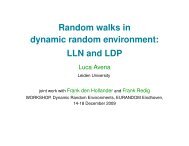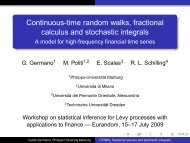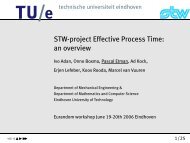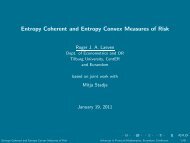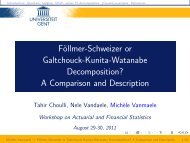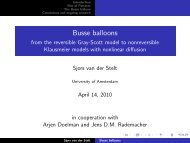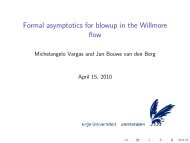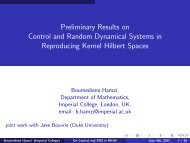EURANDOM
EURANDOM
EURANDOM
Create successful ePaper yourself
Turn your PDF publications into a flip-book with our unique Google optimized e-Paper software.
This workshop was held on the topic of models, especially models having their origin in statistical mechanics,<br />
in which two levels of randomness can play a role, with the title Order, Disorder and Double<br />
Disorder.<br />
Examples are thermal disorder versus quenched disorder such as occurs for example in spin glasses, of<br />
stochastic models on random graphs, or random walks in random environments.<br />
The workshop was attended and enjoyed by 35 participants who often had intensive and stimulating<br />
discussions, also during the time between and after the lectures.<br />
Three minicourses, each consisting of three lectures, were held by F.V. Jensen (Aalborg) on Bayesian<br />
Networks, A. Montanari (Stanford) on Statistical Mechanics on General Graphs, and C.M. Newman and<br />
M. Damron (both New York) on Metastates and Applications.<br />
Moreover there were lectures by:<br />
L.P. Arguin (New York) on Ultrametricity in Spin Glasses, N. Berger (Jerusalem) on Random Walk in<br />
Random Environment, E. Bolthausen (Zürich) on Spin Glasses, A. Bovier (Bonn) on Metastability in a<br />
random model, N. Gantert (Münster) on Biased Random Walks on Trees, O. Häggström (Göthenburg)<br />
on The contributions of Oded Schramm to Percolation Theory on Nonamenable Graphs, R.W. van der<br />
Hofstad (Eindhoven) on First-passage Percolation in Random Graphs, D. Ioffe (Haifa) on Supercritical<br />
Percolation, N. Kistler (Bonn) on the Perceptron and Generalized Random Energy Models, V. Sidoravicius<br />
(Amsterdam) on Sandpiles and Activated Random Walks, F. Takens (Groningen) on Historic Behaviour.<br />
Sponsors:<br />
Netherlands Organization for Scientific Research (NWO), Royal Netherlands Academy of Arts and<br />
Sciences (KNAW), NSF-Partnerships for International Research and Education (PIRE), the mathematics<br />
cluster NWO-Nonlinear Dynamics of Natural Systems (NDSN+).<br />
October 5-7, 2009 (SIM)<br />
YES-III (Young European Statisticians) - Paradigms of Model Choice<br />
Organizers:<br />
Laurie Davies, University of Duisburg-Essen, Eindhoven University of Technology, <strong>EURANDOM</strong>,<br />
Geurt Jongbloed, University of Technology, Delft<br />
Participants: 33<br />
The goal of the workshop was to acquaint young researchers (PhD’s and PD’s) with different paradigms<br />
of model choice. Virtually every statistical analysis is based on a stochastic model for the data so<br />
that the choice of model has a direct influence on the results of the analysis. There are many different<br />
schools of thought as to how to choose one or more models for a given data set. Apart from important<br />
but pragmatic considerations such as computability, the choice of model depends on certain epistemological<br />
principles which differ from school to school.<br />
There were four invited speakers Laurie Davies (Approximation), Peter Grünwald (Minimum Description<br />
Length), Nils Hjort (Focussed Information Criterion) and Christian Robert (Computational Approaches<br />
to Bayesian Model Choice). Unfortunately Peter Grünwald was taken ill after his first talk and<br />
was unable to participate in the remainder of the workshop. The remaining three invited speakers<br />
gave three 45 minute talks on their different approaches to model choice. These were interspersed by<br />
11 talks each of 20 minutes given by other participants. The topics included circular deconvolution, variable<br />
selection for the high dimensional Cox model and the estimation of human dose response<br />
curves.<br />
To compensate for the absence of the talks by Peter Grünwald there were discussions at the end of<br />
each morning and afternoon session rather than at the end of each day as initially planned. The discussions<br />
were lively, interesting, at times times controversial but always held in a friendly atmosphere. The<br />
last discussion was particularly successful as the participants were then able to pose more informed<br />
questions and give more informed criticisms of the different paradigms of model choice.<br />
There were 33 participants (23 men, 10 women) who came from seven European countries: Belgium,<br />
France , Germany, Holland, Italy, Norway and Switzerland.<br />
Sponsors:<br />
Eindhoven University of Technology, Netherlands Organization for Scientific Research (NWO), Thomas<br />
Stieltjes Institute for Mathematics, Eindhoven University of Technology.<br />
<strong>EURANDOM</strong> Annual Report 2009 29


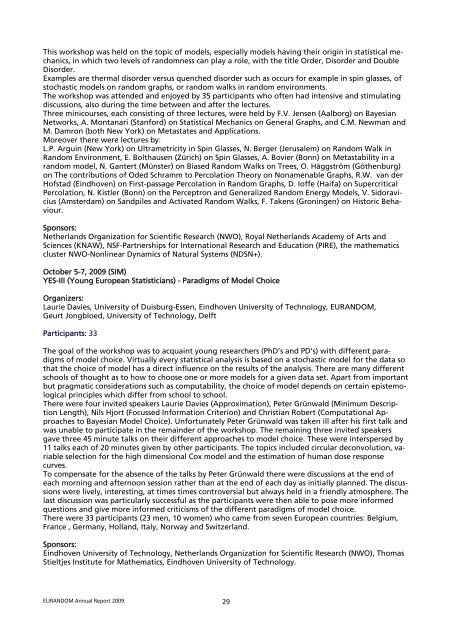
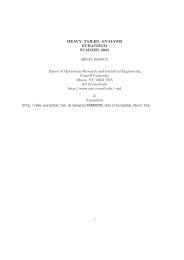
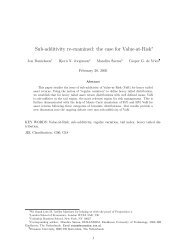
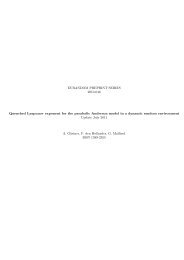
![The Contraction Method on C([0,1]) and Donsker's ... - Eurandom](https://img.yumpu.com/19554492/1/190x143/the-contraction-method-on-c01-and-donskers-eurandom.jpg?quality=85)
